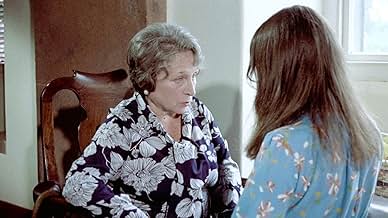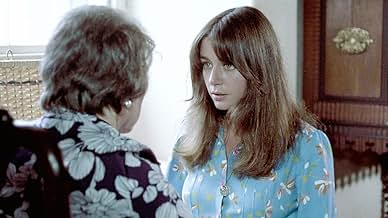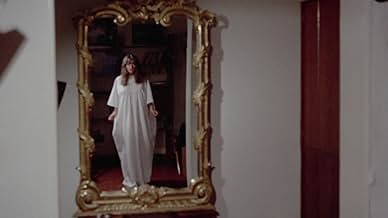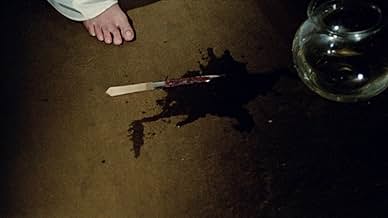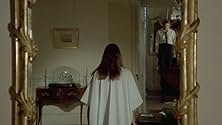Una cantante di discoteca è perseguitata dal fantasma del suo defunto padre. Il morto la evoca attraverso uno specchio, costringendola a commettere una serie di crimini violenti.Una cantante di discoteca è perseguitata dal fantasma del suo defunto padre. Il morto la evoca attraverso uno specchio, costringendola a commettere una serie di crimini violenti.Una cantante di discoteca è perseguitata dal fantasma del suo defunto padre. Il morto la evoca attraverso uno specchio, costringendola a commettere una serie di crimini violenti.
- Premi
- 1 vittoria in totale
Robert Woods
- Bill
- (as Robert Wood)
Françoise Brion
- Carla
- (as Francoise Brion)
Alice Arno
- Tina
- (as Alice Arnó)
María Bassó
- Elvira
- (as Maria Bassó)
Ada Tauler
- Stefania
- (as Adela Tauler)
Chantal Broquet
- Angela
- (non citato nei titoli originali)
Carmen Carbonell
- Tante
- (non citato nei titoli originali)
Jesús Franco
- Roger
- (non citato nei titoli originali)
Nicole Guettard
- Gloria
- (non citato nei titoli originali)
Monica Swinn
- Marie's Girlfriend (French version only)
- (non citato nei titoli originali)
Recensioni in evidenza
This is a Jess Franco film which seems to have garnered something of a good reputation amongst the vast array of his output. While I perused through the user reviews here I couldn't help but wonder if I had seen the same film, as from the plot synopsis offered by many of these I found there were several very key things I couldn't recall even happening on screen. I soon discovered that the reason for this is that there are three versions of this movie - the Spanish being the definitive cut it seems – and I saw the Italian variant which, like several other Franco films from the period had been turned into an adult film by way of some hardcore scenes being spliced into the flow. I think it would be only fair to guess that this version is not the best out there and compromises Franco's original vision somewhat.
The story is about a woman who goes into a downward psychological spiral after the suicide of her sister. She subsequently sees visions of her dead sibling which leads her to go out and murder men.
One of the chief differences between the versions is that in the Spanish one it is her dead father (played by Franco regular Howard Vernon) who she sees from beyond the grave, as opposed to her sister in the Italian version. This change seems to have been made principally to allow for the introduction of Lina Romay who, in her role as the sister, spends the whole time frolicking around naked and is at the centre of all the hardcore scenes too. These scenes, incidentally, are fairly half-heartedly executed and seem to be there simply as a means of selling the movie as an adult feature. However, unless I simply wasn't paying very good attention, this change also means that the whole mirror idea seems to have been more or less eradicated aside from a scene late on where it is smashed resulting in the breaking of the supernatural spell. Up to that point however, it seemed to me that all of this malarkey was going on in the head of the main actress, not playing out in an actual mirror! Despite these issues with the Italian version, this still made for interesting enough viewing. Despite its definite sexploitation angle, it is in essence quite a haunting tale. It's quite hard to reasonably categorize in actual fact because it has several feet in different sub-genres without truly focusing on one thread fully. I can only really comment on the version I have seen and going by that I couldn't put this in the upper bracket of Franco features; it's in the top half of his output though for sure. Like most of his films it has that rushed look and feel, while the production values are pretty limited. But it would seem that the Spanish version is the one to see if you want a proper reflection of this one's merits.
The story is about a woman who goes into a downward psychological spiral after the suicide of her sister. She subsequently sees visions of her dead sibling which leads her to go out and murder men.
One of the chief differences between the versions is that in the Spanish one it is her dead father (played by Franco regular Howard Vernon) who she sees from beyond the grave, as opposed to her sister in the Italian version. This change seems to have been made principally to allow for the introduction of Lina Romay who, in her role as the sister, spends the whole time frolicking around naked and is at the centre of all the hardcore scenes too. These scenes, incidentally, are fairly half-heartedly executed and seem to be there simply as a means of selling the movie as an adult feature. However, unless I simply wasn't paying very good attention, this change also means that the whole mirror idea seems to have been more or less eradicated aside from a scene late on where it is smashed resulting in the breaking of the supernatural spell. Up to that point however, it seemed to me that all of this malarkey was going on in the head of the main actress, not playing out in an actual mirror! Despite these issues with the Italian version, this still made for interesting enough viewing. Despite its definite sexploitation angle, it is in essence quite a haunting tale. It's quite hard to reasonably categorize in actual fact because it has several feet in different sub-genres without truly focusing on one thread fully. I can only really comment on the version I have seen and going by that I couldn't put this in the upper bracket of Franco features; it's in the top half of his output though for sure. Like most of his films it has that rushed look and feel, while the production values are pretty limited. But it would seem that the Spanish version is the one to see if you want a proper reflection of this one's merits.
This average-budget film contains thrills , a criminal intrigue and various murders . It's a passable slasher movie directed by prolific filmmaker Jess Frank concerning a nightclub singer is haunted by the ghost of her late dad . Anetta(Emma Cohen) is a pianist in cabarets and nightclubs , she's very close to her widower father (Howard Vernon) after their mother's death . Anetta suffers a tragedy on the eve of her wedding to Arturo (Wal Davis) , as his father is extremely opposed to this marriage , that's why he commits suicide by hanging . Later on , the dead man summons her through a mirror , forcing her to commit a series of violent crimes . This becomes a nightmare for her when she starts seeing him in all the mirrors making signs.
Austerily slasher film revolving around an unsettling , deranged young woman who suffered an emotional crisis that is torn between death and pain expressed in the reflection of the windows . It contains thrills , chills , haunting poetic fantasy , nudism and grisly killings . Here Franco manages to give us an adequate ambient , evocative production design , being regularly narrated , including a murders plot enough to keep you intrigued throughout the flick . In this passable as well as eerie yarn , Franco established his ordinary poetic and visually striking style . There are other versions in which Annette and Mary are sisters , and the latter haunting Annette on the mirror and another hardcore retelling with Lina Romay , Franco's muse , playing the erotic scenes , as usual . Emma Cohen gives a decent acting as singer/pianist Ana who will kill all men who feels sexually attracted to her by fulfilling the wishes of the late daddy . She's well accompanied by a good cast , some of them Franco's regulars , such as : Robert Woods , Alice Arno , Françoise Brion , Philippe Lemaire , Ramiro Oliveros and Howard Vernon as the father incites her to an unprecedented massacre. And Jesus Franco or Jess Frank cameo as a pianist at a bar .
One of the slasher movies by prolific writer/producer/director Jesús Franco , one of the kings of the ¨Spanish Fantaterror¨, and considered to be one of the best films from his second period . Jesús Franco who never considered the film to be a horror story , but instead felt it was tale of "anguish". Being produced in short budget by Robert de Nesle and José María Forqué . It packs evocative cinematography by Antonio Millán, filmed on Portuguese locations in Lisbon, Madeira, Tobis Portuguesa, Lumiar, Lisbon, (studio) . Likewise, atmospheric musical score by André Bénichou and Adolfo Waitzman, including Jazzy soundtrack and catching songs . The motion picture was regular but professionally directed by Jesus Franco. However , here he doesn't use his trademarks , as he carries out a traditional narration , without excessive zooms , neither lousy pace . Jesus uses to sign under pseudonym , among the aliases he used, apart from the names Jess Franco or Franco Manera, were Jess Frank, Robert Zimmerman, Frank Hollman, Clifford Brown, David Khune , Toni Falt, James P. Johnson, Charlie Christian, David Tough , among others . Franco used to utilize usual marks such as zooms , nudism , foreground on objects , filmmaking in ¨do-it-yourself effort¨ style or DIY , double-versions , and managing to work extraordinarily quickly . In many of the more than 180 films he's directed he has also worked as composer, writer, cinematographer and editor. His first was "We Are 18 Years Old" and the second picture was ¨Gritos en la Noche¨ (1962) , the best of all them , also titled "The Awful Dr. Orlof" , it's followed by various sequels such as El Secreto del Dr. Orloff (1964) aka "The Mistresses of Dr. Jekyll" , " Orloff y el hombre invisible (1970) aka "Dr. Orloff's Invisible Monster" and finally "Faceless" (1987) . He also directed to the great Christopher Lee in 4 films : "The Bloody Judge" , ¨Count Dracula¨, ¨The Blood of Fu Manchu¨ and ¨The castle of Fu Manchu¨ . Jesús's influence has been notable all over Europe . From his huge body of work we can deduce that Jesús Franco is one of the most restless directors of Spanish cinema and often releasing several titles at the same time. Many of his films have had problems in getting released, and others have been made directly for video. More than once his staunchest supporters have found his "new" films to contain much footage from one or more of his older films . Jesús Franco is a survivor in a time when most of his colleagues tried to please the government administration. He broke up with all that and got the independence he was seeking. He always went upstream in an ephemeral industry that fed opportunists and curbed the activity of many professionals . But time doesn't pass in vain, and Jesus' production diminished since the 90s ; however he went on shooting until his death . Al otro lado del espejo (1973) rating : 5.5/10 . Mediocre but passable.
Austerily slasher film revolving around an unsettling , deranged young woman who suffered an emotional crisis that is torn between death and pain expressed in the reflection of the windows . It contains thrills , chills , haunting poetic fantasy , nudism and grisly killings . Here Franco manages to give us an adequate ambient , evocative production design , being regularly narrated , including a murders plot enough to keep you intrigued throughout the flick . In this passable as well as eerie yarn , Franco established his ordinary poetic and visually striking style . There are other versions in which Annette and Mary are sisters , and the latter haunting Annette on the mirror and another hardcore retelling with Lina Romay , Franco's muse , playing the erotic scenes , as usual . Emma Cohen gives a decent acting as singer/pianist Ana who will kill all men who feels sexually attracted to her by fulfilling the wishes of the late daddy . She's well accompanied by a good cast , some of them Franco's regulars , such as : Robert Woods , Alice Arno , Françoise Brion , Philippe Lemaire , Ramiro Oliveros and Howard Vernon as the father incites her to an unprecedented massacre. And Jesus Franco or Jess Frank cameo as a pianist at a bar .
One of the slasher movies by prolific writer/producer/director Jesús Franco , one of the kings of the ¨Spanish Fantaterror¨, and considered to be one of the best films from his second period . Jesús Franco who never considered the film to be a horror story , but instead felt it was tale of "anguish". Being produced in short budget by Robert de Nesle and José María Forqué . It packs evocative cinematography by Antonio Millán, filmed on Portuguese locations in Lisbon, Madeira, Tobis Portuguesa, Lumiar, Lisbon, (studio) . Likewise, atmospheric musical score by André Bénichou and Adolfo Waitzman, including Jazzy soundtrack and catching songs . The motion picture was regular but professionally directed by Jesus Franco. However , here he doesn't use his trademarks , as he carries out a traditional narration , without excessive zooms , neither lousy pace . Jesus uses to sign under pseudonym , among the aliases he used, apart from the names Jess Franco or Franco Manera, were Jess Frank, Robert Zimmerman, Frank Hollman, Clifford Brown, David Khune , Toni Falt, James P. Johnson, Charlie Christian, David Tough , among others . Franco used to utilize usual marks such as zooms , nudism , foreground on objects , filmmaking in ¨do-it-yourself effort¨ style or DIY , double-versions , and managing to work extraordinarily quickly . In many of the more than 180 films he's directed he has also worked as composer, writer, cinematographer and editor. His first was "We Are 18 Years Old" and the second picture was ¨Gritos en la Noche¨ (1962) , the best of all them , also titled "The Awful Dr. Orlof" , it's followed by various sequels such as El Secreto del Dr. Orloff (1964) aka "The Mistresses of Dr. Jekyll" , " Orloff y el hombre invisible (1970) aka "Dr. Orloff's Invisible Monster" and finally "Faceless" (1987) . He also directed to the great Christopher Lee in 4 films : "The Bloody Judge" , ¨Count Dracula¨, ¨The Blood of Fu Manchu¨ and ¨The castle of Fu Manchu¨ . Jesús's influence has been notable all over Europe . From his huge body of work we can deduce that Jesús Franco is one of the most restless directors of Spanish cinema and often releasing several titles at the same time. Many of his films have had problems in getting released, and others have been made directly for video. More than once his staunchest supporters have found his "new" films to contain much footage from one or more of his older films . Jesús Franco is a survivor in a time when most of his colleagues tried to please the government administration. He broke up with all that and got the independence he was seeking. He always went upstream in an ephemeral industry that fed opportunists and curbed the activity of many professionals . But time doesn't pass in vain, and Jesus' production diminished since the 90s ; however he went on shooting until his death . Al otro lado del espejo (1973) rating : 5.5/10 . Mediocre but passable.
I've only seen about 15 Jess Franco films so far, which is actually saying very little considering the countless amount of films he made, and in spite of the beyond-awful conditions the print I watched had, "Al Otro Lado del Espejo" (which translates to English as "The Other Side of the Mirror") still managed to make a impression on me, and might as well be the finest Franco film I've seen so far. Coming straight after Soledad Miranda's death, and not unlike the interesting but deeply flawed "A Virgin Among the Living Dead", this one is a haunting, beautiful study on death and grief, that "mirrors" Franco's own emotional breakdown after the death of his muse. The story stars Emma Cohen as Anna - a young bride-to-be who suffers a breakdown after her father (Franco-regular Howard Vernon) commits suicide on the eve of her wedding. She then starts having visions of her father through mirrors, beckoning her, and soon enough, goes on a killing spree against the men who sexually arouse her. The script is very cleverly written, with well developed characters that you actually care for, as well as being filled with Greek-mythology symbolism and Freudian motifs. Franco also benefits largely from having one of the best actresses he ever worked with playing the lead role. Cohen has that same innocents, doe-eyed beauty of Jessica Harper in "Suspiria", and gives one harrowing, psychotic and ultimately hearth-breaking performance as our grieving protagonist. The music, as usual for a Franco film, has great importance within the context of the film (since Anna is a nightclub singer who often "escapes" from her hectic life by entering into a "purely musical" state of mind), and composer Adolfo Waitzman (who also scored the same year's "A Bell from Hell" and the underrated "Pensione Paura") just nails it with a wonderful jazzy score. Another great aspect of the film is that this is probably the first Franco film that was actually creeped me out, and predates "Candyman" for almost 30 as far as "making mirrors scary as Hell" is concerned. Although the version I saw of this film was in a terrible state and was actually hard to watch at times, the cinematography appeared to be quite good, thus making it even sadder that it isn't available in a remastered, polished DVD. Speaking of which, the film is only available (this cut, at least) in Spanish with no subtitles, but since this is a very visual film (and if you know the main plot beforehand), it's not hard to figure out what's going on. The major problem with this film is that it starts quite well, but looses steam in between the end of the second act and beginning of the third, as Franco seemingly forgets he is a doing a horror film and just throws a series of non-stop, dull "jam sessions" that, though somewhat relevant to the plot, go on for a bit too long, ruining the oppressive atmosphere it had been building for so long. Thankfully, the film gets it's steam back at the ending, which remains the most powerful, twisted and just plain haunting I've seen in a Franco film. Overall, a brilliant gem of Spanish horror film that, though not for everyone, is essential viewing for fans of Eurohorror and Jess Franco alike. 9/10 Be aware, however, that the film is available in three different versions. The original Spanish cut, which is the version I've seen and the one Franco prefers; the soft-core French version which replaces Howard Vernon for Lina Romay as Anna's dead nymphomaniac sister; and the hardcore Italian version that adds even more sex and sleaze to the French version. The last two versions, though I've never actually seen them, seemingly does to the film what "House of Exorcism" did to "Lisa and the Devil", totally butchering what the director was aiming for, and should be avoided unless you're a hardcore Franco fan.
As most know, there are 3 versions of the film. The Spanish is considered to be the true director's cut. The French changes the plot and swaps actors, while an Italian print adds hardcore bits to the newly added sex scenes from the French version. While it is frequently cited that the material in the French and Italian films were shot later, this is not entirely true. The Lina Romay footage was lensed later, but there are 3 extended nude scenes with Emma Cohen that were from the initial shoot, and I believe Franco would want them in any 'director's cut' DVD that will hopefully appear. They can easily be edited back into the Spanish print ( I've made myself a copy for future viewings ). Are the nude scenes essential to the plot, well perhaps not. But knowing how Franco adores the female form, coupled with Cohen's beautiful presence....I'd strongly feel he wanted them in the Spanish cut but was prevented by the strict censorship of the Spain at the time.
Here is another of those elusive Franco films that in its proper context is neither horror, nor porn or sexploitation, in spite of the hardcore inserts, but wandering around urges.
Now I appreciate Franco in the way you do with a friend or co-worker you have known forever. I appreciate him, in part, because of how familiar his flaws and habits. So I won't mollycoddle him or pretend in his face: he was often sloppy, charmless as a thinker and embarrassing in a number of ways. Whereas some fans read profundity in this film, for me all the stuff about mirrors, madness and theater as staged inner life are as sophomoric as it gets, for instance that whispers of a damaged mind will issue from a mirror.
Let me say here that it's not the elements themselves, which others like Rivette, Resnais and Ruiz have used to similar effect, but the narrative distance they are placed away from the viewer, distance that leads up to them and away from.
But I accept it as part of the experience of shared intuition that is possible with a good friend; Franco is worth knowing because, going past conscious narrative impositions, I can relax in a fluid fabric of images which he seems to spontaneously stir up from life as he walks through it. The more of his films I watch, the more I relax because I have shared in previous travels.
It's all in the last scene here.
Leading up to it we have obviously layered madness about a woman reliving guilt from her past, inserts of incestual cunnilingus and hardcore sex (in the Italian version I saw), and relaxed wandering around bars and later exotic Madeira. As a whole the film evokes Franco's films with Soledad, She Killed in Ecstasy and Eugenie. It is not as 'pure' as Female Vampire, nor on the other hand as testing.
The idea, tremendously simple, is that a woman wanted to get married, but her beloved sister killed herself out of desperation and perhaps spurned love, and she carries this burden in unfulfilled affairs with men.
The Spanish version without the inserts may flesh out the story a bit more, but story is not the main point, it's swimming across to where images acquire life of their own.
In the last scene we have all this, the wandering, madness, and repressed emotion, coalesce together in a beautiful way as a bridal veil fluttering in the wind.
Now I appreciate Franco in the way you do with a friend or co-worker you have known forever. I appreciate him, in part, because of how familiar his flaws and habits. So I won't mollycoddle him or pretend in his face: he was often sloppy, charmless as a thinker and embarrassing in a number of ways. Whereas some fans read profundity in this film, for me all the stuff about mirrors, madness and theater as staged inner life are as sophomoric as it gets, for instance that whispers of a damaged mind will issue from a mirror.
Let me say here that it's not the elements themselves, which others like Rivette, Resnais and Ruiz have used to similar effect, but the narrative distance they are placed away from the viewer, distance that leads up to them and away from.
But I accept it as part of the experience of shared intuition that is possible with a good friend; Franco is worth knowing because, going past conscious narrative impositions, I can relax in a fluid fabric of images which he seems to spontaneously stir up from life as he walks through it. The more of his films I watch, the more I relax because I have shared in previous travels.
It's all in the last scene here.
Leading up to it we have obviously layered madness about a woman reliving guilt from her past, inserts of incestual cunnilingus and hardcore sex (in the Italian version I saw), and relaxed wandering around bars and later exotic Madeira. As a whole the film evokes Franco's films with Soledad, She Killed in Ecstasy and Eugenie. It is not as 'pure' as Female Vampire, nor on the other hand as testing.
The idea, tremendously simple, is that a woman wanted to get married, but her beloved sister killed herself out of desperation and perhaps spurned love, and she carries this burden in unfulfilled affairs with men.
The Spanish version without the inserts may flesh out the story a bit more, but story is not the main point, it's swimming across to where images acquire life of their own.
In the last scene we have all this, the wandering, madness, and repressed emotion, coalesce together in a beautiful way as a bridal veil fluttering in the wind.
Lo sapevi?
- BlooperIn the end credits of the Spanish version, Françoise Brion is credited as Carla and Alice Arno is credited as Tina but in the film, it's the other way around.
- ConnessioniReferenced in Franco Noir (2021)
I più visti
Accedi per valutare e creare un elenco di titoli salvati per ottenere consigli personalizzati
- How long is The Other Side of the Mirror?Powered by Alexa
Dettagli
- Data di uscita
- Paesi di origine
- Lingua
- Celebre anche come
- Lo specchio del piacere
- Luoghi delle riprese
- Lisbona, Portogallo(Exterior)
- Aziende produttrici
- Vedi altri crediti dell’azienda su IMDbPro
- Tempo di esecuzione
- 1h 22min(82 min)
- Mix di suoni
- Proporzioni
- 1.85 : 1
Contribuisci a questa pagina
Suggerisci una modifica o aggiungi i contenuti mancanti

